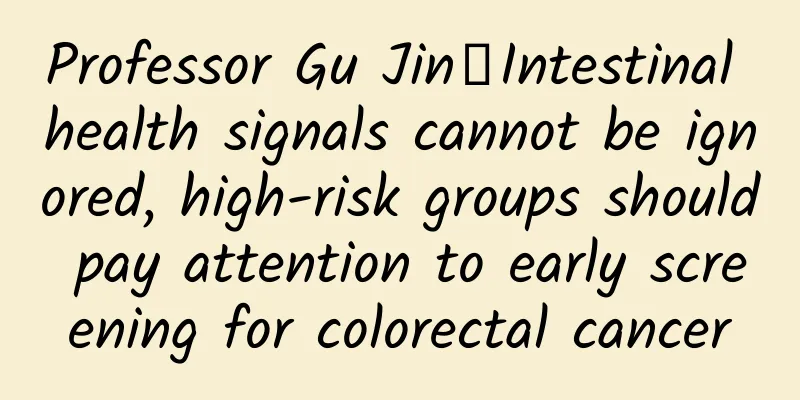Professor Gu Jin丨Intestinal health signals cannot be ignored, high-risk groups should pay attention to early screening for colorectal cancer

|
The intestine is an important organ of the human body, responsible for important tasks such as digestion and immunity, and has a significant impact on human health. If there is a problem with the intestine, not only common diseases such as constipation, diarrhea, and polyps will occur, but if not treated in time, it may also lead to cancer. Colorectal cancer includes colon cancer and rectal cancer, and is one of the common malignant tumors in my country. According to data from the National Cancer Center, there were 517,000 new cases of colorectal cancer in 2022, ranking second among all new malignant tumors. May 29 is World Intestinal Health Day. Professor Gu Jin, president of Peking University Shougang Hospital, said in an interview that there is a significant difference in the five-year survival rate between early and late colorectal cancer. Early colorectal cancer often has a good prognosis after treatment, but if the patient has distant metastasis and enters the late stage, the patient's five-year survival rate will be significantly reduced. In recent years, with the gradual attention paid to early screening, the survival rate of colorectal patients has increased significantly. At the same time, with the development of innovative treatments such as molecular targeted drugs and immunotherapy, new hope has been brought to the treatment of patients with advanced colorectal cancer. Be alert to abnormal symptoms and focus on early screening Due to the lack of specific symptoms in the early stage, most colorectal cancer patients are already in the middle and late stages when diagnosed. However, in Professor Gu Jin's opinion, the onset of colorectal cancer is still "traceable", such as smoking, obesity, drinking, unbalanced diet, and liking to eat pickled food are all risk factors for colorectal cancer. There are also many precancerous lesions, such as polyps, intestinal adenomas, or chronic inflammatory bowel diseases such as Crohn's disease and ulcerative colitis. If not discovered and treated in time, they may also induce colorectal cancer in ten to twenty years. In addition, changes in bowel habits are also a health "signal" worthy of attention. Professor Gu Jin explained that if you suffer from intestinal tumors, the intestinal cavity will become narrower, and feces will not be easily discharged, which can easily lead to symptoms similar to "constipation"; on the other hand, some elderly patients experience alternating diarrhea and constipation without any inducement, but they do not pay attention to it, which leads to delays in the disease. "Generally speaking, the peak age of colorectal cancer is 70-80 years old, but now we have also observed an increase in the incidence of young and middle-aged people, which may be related to factors such as eating habits, lifestyle, and family inheritance." Professor Gu Jin said that the guidelines recommend that the general population start regular colorectal cancer screening after the age of 45. At present, there are two main types of colorectal cancer screening in my country, namely stool examination and colonoscopy, among which colonoscopy is also recognized as the "gold standard" for colorectal cancer screening. For people with a family genetic tendency, the age of screening needs to be advanced. The two more clear hereditary colorectal cancers include familial adenomatous polyposis (FAP) and Lynch syndrome. Advanced colorectal cancer can be cured with innovative treatments So, if you are unfortunately diagnosed with colorectal cancer, does it mean that you have a "terminal illness"? Professor Gu Jin said that generally speaking, the earlier the diagnosis, the higher the possibility of long-term survival. On the other hand, with the advancement of surgical techniques, the development of innovative drugs and other innovative treatment methods in recent years, the survival of patients has improved significantly. Through scientific management after colorectal cancer surgery, the 5-year survival rate can reach 60%-70%, which is a significant improvement over the past. Professor Gu Jin recalled that he had treated a 28-year-old young male patient with colorectal cancer who had experienced multiple postoperative tumor recurrences and his condition progressed rapidly, making his condition extremely critical. After carefully inquiring about his family history, he highly suspected hereditary colorectal cancer. After genetic testing, it was found that the patient had microsatellite high instability (MSI-H)/mismatch repair deficiency (dMMR), and it was confirmed that the colorectal cancer was caused by Lynch syndrome. Fortunately, immunotherapy drugs for this type of MSI-H/dMMR colorectal cancer were available at the time. After the patient applied the innovative treatment plan, his condition miraculously improved and the tumor gradually disappeared. Professor Gu Jin lamented that he still remembered that after the third recurrence, the patient had lost confidence in treatment, but now, many years later, the patient is not only alive and well, but also married and had children and returned to a normal life. It is understood that Lynch syndrome is an autosomal dominant tumor syndrome caused by a defect in the mismatch repair (MMR) system, which is characterized by familial aggregation and a young age of onset. The risk of colorectal cancer in this group of people throughout their lives is 70-80%, and the risk of malignant tumors in other parts (including endometrium, ovary, stomach, small intestine, liver and gallbladder, upper urinary tract, brain and skin, etc.) is also significantly increased. Genetic testing is an important means of diagnosing Lynch syndrome, and such patients are usually accompanied by MSI-H/dMMR. In fact, a large number of studies have confirmed that colorectal cancer with MSI-H/dMMR may have better therapeutic effects with immunotherapy and may have a better prognosis than other colorectal cancers. Professor Gu Jin said that it is currently known that about 15% of colorectal cancer patients have MSI-H/dMMR. Although the proportion is not high, it is also an important progress in the precision treatment of colorectal cancer. |
<<: Do these two points and easily cultivate children's autonomy
>>: [Health Lecture] Do you know the reason for low platelet count?
Recommend
Is it difficult to get pregnant if you have a cold body?
In our lives, most women's bodies are not as ...
What are some ways to relieve period pain?
Some girls have poor physical constitution or thi...
Counterpoint: India's smartphone market revenue will grow 9% year-on-year in 2024, reaching a record high
According to the latest data from market research...
What to do if you have anemia in 8 months of pregnancy
For pregnant women during pregnancy, they usually...
How long does it take for menstruation to be clean after abortion?
Nowadays, abortion is no longer a rare thing. Man...
Pain when pressing on the lower edge of the breast
Everyone's physical constitution is different...
How do ordinary employees toast their leaders? What should be paid attention to when toasting leaders?
China has a strong drinking culture. Everyone wil...
Tips for girls to get rid of beards
Many people think that growing beards is unique t...
Is it necessary to do curettage for uterine polyps?
In clinical practice, uterine polyps are very com...
How long does it take to recover from a cesarean section?
If you choose to have a caesarean section to give...
A famous singer died of melanoma at the age of 37! What kind of "moles" should we be wary of?
June 14, 2023 “Melanoma” became a hot search on W...
Can postpartum venous thrombosis be cured?
Giving birth to a child is the most anticipated t...
How to Prevent and Treat Stretch Marks
The birth of every baby is the hope of every fami...
What are the taboos when treating gynecological diseases?
Gynecological inflammation is a common and freque...
How to eliminate stretch marks after childbirth
The birth of every baby is the hope of every fami...









